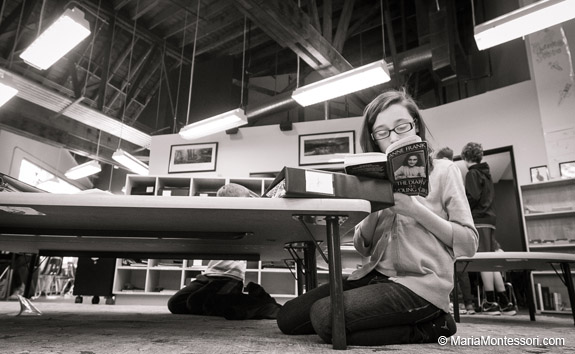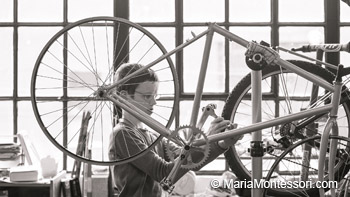
October 29, 2022
PART 3 of 3 on Montessori and Play
The child, unlike the adult, is not on his way to death. He is on his way to life. His work is to fashion a man in the fullness of his strength. By the time the adult exists, the child has vanished. So the whole life of the child is an advance toward perfection, toward a greater completeness. From this we may infer that the child will enjoy doing the work needed to complete himself. The child’s life is one in which work–the doing of one’s duty–begets joy and happiness. For adults, the daily round is more often depressing.
–Dr. Maria Montessori, The Absorbent Mind (page 30)
Many parents fear that Montessori is not playful enough, too academic, and might “rob a child of their childhood.”
Why?
I think there are two reasons: As Montessorians, we call the activities a child engages in “the child’s work.” We speak of the morning “work period.” We ask the child whether he’s completed his “work” and would like to replace it on the shelf. The use of the word “work” is a sign of respect and meant to highlight the importance of what the child does (as against the sometimes less respectful connotation of “mere play”).
In a world where work generally is the diametrical opposite of play, where work is often synonymous with doing something, not because we like it, but as a means to an end, where work many times implies being told what to do, when and for how long, the use of the word “work” to describe the children’s activities almost necessarily conjures up a bleak, joyless environment.
Add to that the tremendously advanced academic results achieved by Montessori children; the calm, socially mature behavior; the lack of traditional toys, dress-up corners, dolls, and the like; the quiet, clean, zen-like beauty of an authentic Montessori class, which stands in sharp contrast to the noisy, cluttered, colorful environment of most preschools, and parents not surprisingly often misinterpret Montessori as a harsh, adult-led, direct instruction environment.

In reality, nothing could be further from the truth! Work, in the Montessori sense, is play, if play is conceived the way Dr. Grey so thoughtfully defined it.
So should Montessorians stop calling the child’s work, work? Should we begin talking about play instead, calling the uninterrupted time “morning play period”, the activities “toys”, and our approach the “Montessori playschool”?
While this might help to make Montessori more accessible to parents in the near term, I think Montessorians rightfully resent any such suggestion. Fundamentally, the separation between “play = fun”, and “work = pain” is what is wrong with our world today. We don’t want our children to accept this view of work and play as opposites. Instead, we want them to expect their meaningful activities to be joyful; we want them to continue, throughout their lives, to learn playfully, to view mistakes not as failures, but as learning opportunities, to enjoy the process of learning and applying what they learn to their work not just at age 3 or 6, but all the way into adulthood (instead of switching to extrinsic motivators like grades, gold stars or ice cream parties as all too often happens in traditional schools.)
Our goal is not the child (or adult) who trudges to school (or a job) Monday through Friday, eternally looking forward to the weekend, where his life really begins. Our goal is the child who relishes in his life’s work—now as a preschooler who is forming himself through his activities, and later, as a successful, happy adult, who will have found a life purpose that fills him with contentment and joy every day of the week.
That is the goal of Montessori. It’s our job, our very own joyful, meaningful work, to help skeptical parents and educators understand that Montessori’s idea of “play as work” is the way to get there.